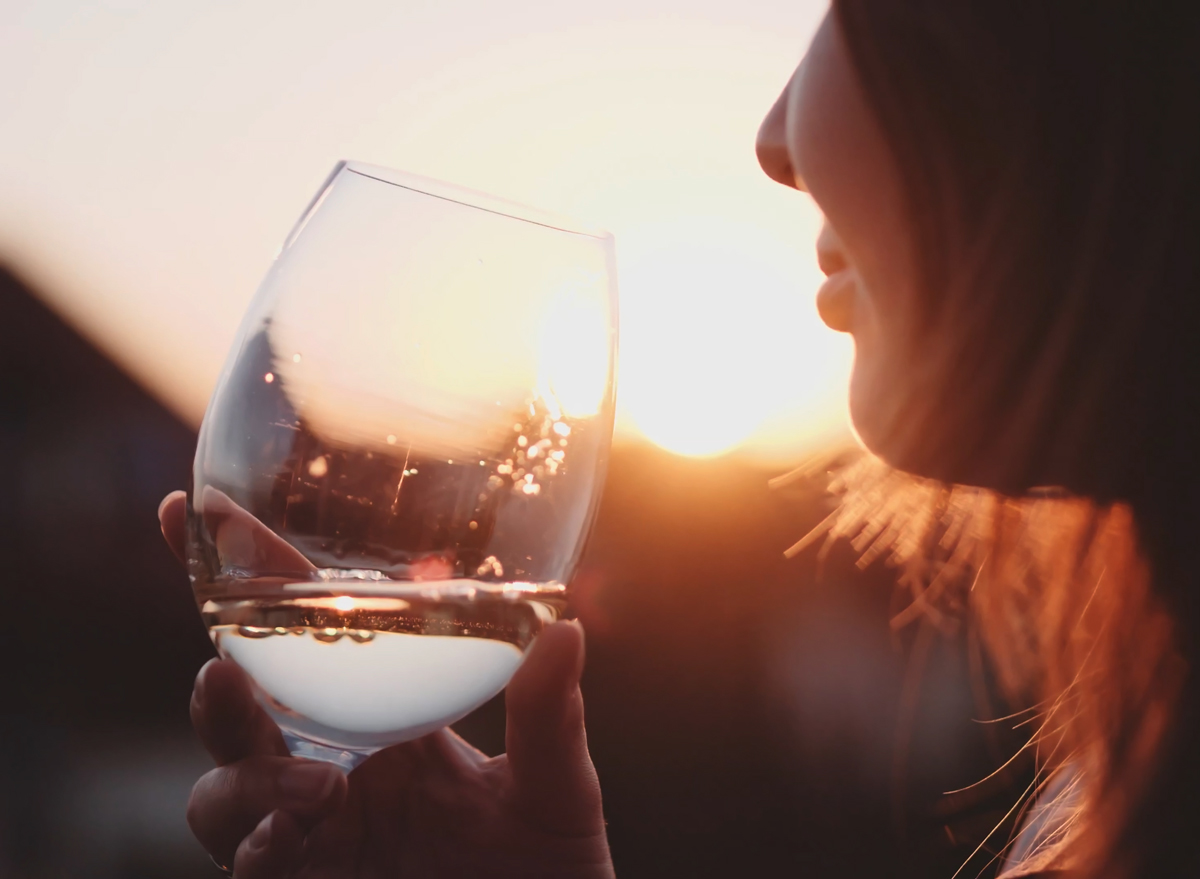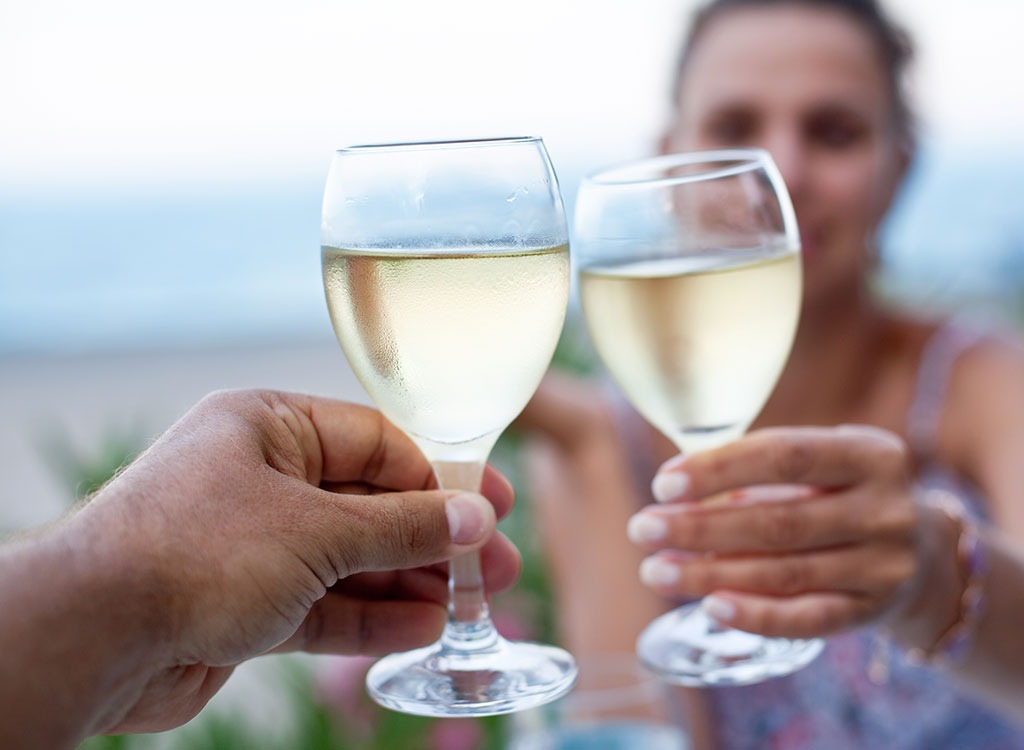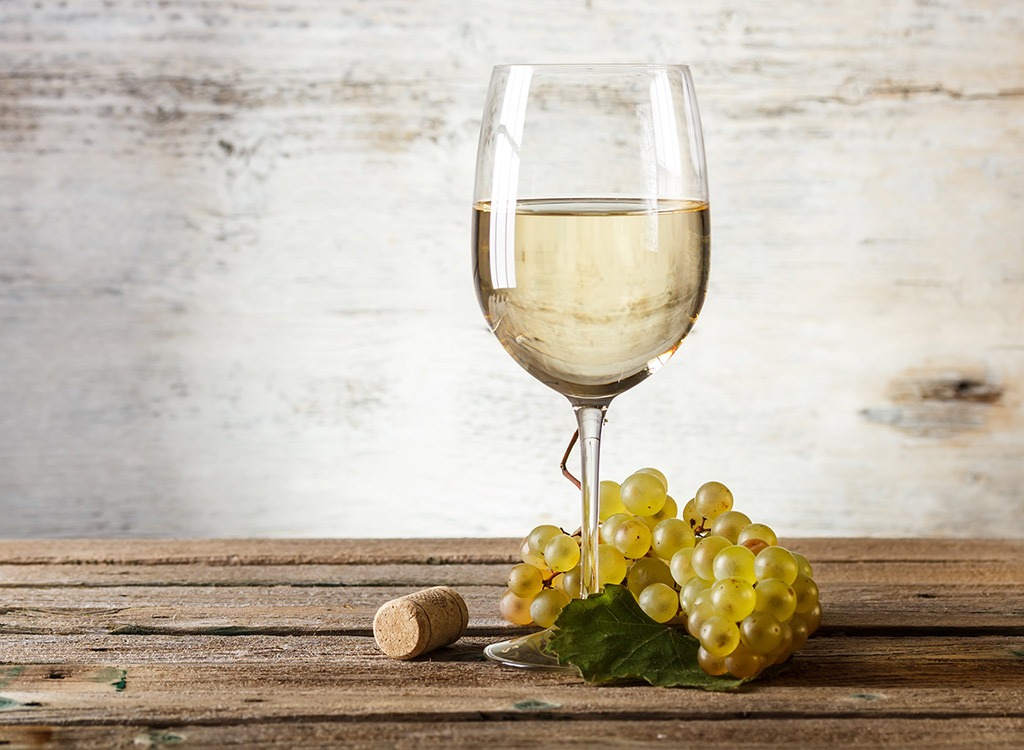What Happens to Your Body When You Drink White Wine

There's nothing like a glass of crisp pinot grigio to wash down a light pasta dish, or a buttery chardonnay to complement a shellfish feast. Whether enjoyed on a romantic patio date, a backyard summer BBQ with friends, or solo on the sofa after a long workday, a refreshing white wine goes down as easy as water—which, let's be real, can be a little dangerous. It's time to ask yourself: What happens to your body when you drink white wine? What kinds of effects can one glass have? Or three?
"White wine can definitely be a part of a healthy diet, especially in moderation," says Sandy Younan Brikho, RD from The Dish on Nutrition. She also adds that the American Heart Association recommends no more than one glass daily for women and no more than two glasses daily for men.
According to Dr. Amy Lee, head of nutrition for Nucific, white wine even provides a small dose of essential vitamins and minerals: 3% of your RDA for magnesium, vitamin B6, vitamin B2, and niacin, as well as 1% of your RDA for riboflavin and trace amounts of iron, calcium, potassium, phosphorus, and zinc.
Yet while there are many potential perks if you drink white wine, there are just as many pitfalls to be aware of. Here's what you need to know before you bust open a bottle.
Plus, if you're looking for some healthy dinner recipes, check out 22 Meals to Melt Belly Fat in 2022.
The antioxidants will protect your heart—and your lungs.

"Red wine tends to get most of the attention for its antioxidant content, including resveratrol—which offers the body some free radical and cardioprotective benefits," says Lisa Richards, a nutritionist and author of The Candida Diet. "However, white wine should not be too quickly disregarded for not having similar benefits. While the antioxidants may not include resveratrol, there is still a high antioxidant load in many white wines."
According to Dr. Rashmi Byakodi, a dentist, health and wellness expert, and editor of Best for Nutrition, unlike red wine, white wine is made without the skin of the grapes—which tends to be packed with antioxidants, like polyphenols.
"However, white wine phenols have a comparable antioxidant capacity," explains Dr. Byakodi.
Specifically, Brikho says white wine contains a phenol called caffeic acid, which may help limit the progression of cardiovascular and kidney disease.
Research has shown that daily white wine consumption is associated with both antioxidative and antiatherogenic effects. One study published in the Journal of Agricultural and Food Chemistry found that grape pulp extract and grape skin extract actually had the same level of antioxidant activity, although the skin extract was found to contain high levels of anthocyanins. Another 2019 study revealed that drinking aged white wine offered heart protection by helping to repair endothelial cells lining the blood vessels.
All of this suggests that white wines could be just as effective as red at protecting your ticker and warding off cancer. Even better—a 2002 study conducted at The University of Buffalo suggested that white wine might have an edge over red in improving lung health.
Here's Why You Need Antioxidants In Your Diet—And How To Eat More Of Them.
Your sleep might suffer.

Think that a glass or two of Riesling will help you get a better night's rest? Think again. While you may pass out more quickly, the alcohol will disrupt the length of your sleep cycles, meaning you're more likely to feel fatigued and sluggish rather than refreshed in the morning.
"There is a common misconception that alcohol will improve sleep when in fact it does the opposite," explains Trista Best, RD at Balance One Supplements. "Alcohol interrupts the REM cycle, which means you will get lower quality sleep when drinking."
By the way, all it really takes is one glass of wine to sabotage your sleep. A 2018 Finnish study revealed that moderate alcohol intake (just one drink for women or two for men) reduced the quality of their rest by 24%, and even low amounts of alcohol reduced it by 9.3%.
Be sure to read up on What Happens When You Drink a Glass of Wine Every Night.
Your body might go into fat storage mode.

While an occasional 5-oz pour of white wine may not have this effect, downing a few glasses in one sitting on the reg can contribute to weight gain, according to Dr. Lee. This is not only because of consuming excess empty calories but also because it releases hormones that trick your body into thinking you need to store fat. For example, the sugar in wine may cause a spike in insulin—the primary fat storage in the body.
"On average, the amount of calories in one glass of white wine is 120 calories," adds Brikho. "Therefore, if you were to consume three glasses, you've consumed 360 calories in white wine alone. In excessive amounts, that could lead to weight gain."
Dr. Lee also points out that the alcohol in white wine lowers your inhibitions, which may lead to overeating or chowing down on less healthy choices.
If you want, you can try cutting the calories when you drink white wine with these 8 Best Low-Calorie Wines for Weight Loss.
Your acid reflux might get triggered.

It's no surprise if you experience a little heart-burn after knocking back a zippy sauvignon blanc or chablis. Some white wines are super acidic—far more than their red counterparts. That's why, as research has consistently shown, white wine can induce gastroesophageal reflux. In fact, studies have indicated that it's just as bad as beer in this regard.
Note that sweet whites, like riesling, tend to be higher in acidity. So, if you know that white wine is a trigger for your acid reflux, then you might consider switching to a dryer one—and limiting your consumption to just one glass.
You might increase your risk of skin cancer.

We know what you're thinking. What connection could there possibly be between sipping on white wine and getting skin cancer? But research has shown that there is, indeed, a potential link between the two. A 2016 study conducted by Brown University found that white wine was associated with a higher risk of melanoma—the deadliest type of skin cancer—than red wine, beer, or liquor. Specifically, each glass of white wine per day was associated with a 13% increased risk.
While researchers aren't entirely sure of the reason behind this connection, they speculated that it may be due to the fact that white wine contains more acetaldehyde and a lower concentration of antioxidants than red. As a result, white wine drinkers may be more susceptible to sunburns.
Your brain may benefit.

A glass of white wine a day may very well keep neurological disease away—as increasing research has shown that its antioxidants may help to protect against cognitive decline. For example, a 2018 study published in the Journal of Nutritional Biochemistry demonstrated that mice who consumed polyphenols extracted from white wine for two months had a lower risk of developing cognitive problems leading to Alzheimer's disease.
Another 2018 study published in Scientific Reports showed that low levels of alcohol consumption can reduce inflammation while helping the brain clear away toxins, including those associated with Alzheimer's disease. Remember, the keywords here are "low levels"—overdoing it on the wine could have the opposite effect. Researcher Maiken Nedergaard, MD, noted that excessive amounts of alcohol over an extended period of time can actually cause damage to the central nervous system.
Now that you know all about what happens when you drink white wine, here are 12 Surprising Health Benefits of Red Wine.









